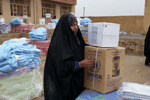Published on Thu, 2014-08-21 13:49
The UN’s Inter-governmental Committee of Experts on Sustainable Development Financing (it is a bit of a mouthful, I know) met for the last time this month to put the final touches to their much anticipated report on how the world should finance the post-2015 Sustainable Development Goals – or SDGs. So what have they come up with? Does it offer a sensible strategy for financing the new international development vision? Will the report be the game-changer many civil society organizations want to see? And how far will it support human rights realization for all? |
Published on Thu, 2014-08-14 19:45
Social Watch calls on the international community to declare the Gaza Strip as an "international humanitarian disaster zone", as requested by the Palestinian NGOs. The flow of humanitarian assistance needs to be accelerated and civilians need to be protected. "The recurrence of these episodes in Gaza -says the Social Watch statement- is the result of not having acted before on similar war crimes and of not having pursued with good faith negotiations towards a lasting peace. The current ceasefire has to be maintained and the international community should back it proactively. |
Published on Thu, 2014-08-14 19:04
The last few decades have seen two mutually reinforcing trends with regard to government budgets. First, though fiscal policy has long been seen as a key tool for governments to support stable economies and provide public services, the instrumental role of budgets in promoting development, redistributing wealth, and reducing poverty has been increasingly recognized. Second, this growing recognition of the importance of budgeting in addressing some of the world’s most persistent challenges has been a major factor in transparency and accountability becoming fashionable. While budgets today have a global profile like never before, the lingo connecting public budgets to people’s lives has a clear precedent in the International Covenant on Economic, Social and Cultural Rights (ICESCR), adopted by the UN General Assembly in 1966 |
Published on Wed, 2014-08-13 11:07
Palestinian NGOs Network (PNGO) called on the international community and the United Nations (UN) to speed up implementation of declaration of Gaza Strip a 'humanitarian disaster zone'. PNGO demanded to ensure the flow of all forms of humanitarian aids as well as evacuate the injured and secure a protection for the civilians, in the light of the continuing Israeli offensive and its repercussions on the initially deteriorated humanitarian situation in the besieged Gaza Strip. The Palestinian NGOs Network (PNGO) on Tuesday 12, held a press conference at Gaza's Al-Shifa Hospital Compound, with participation of each of Chairman of the Board of the Palestinian NGOs Network, Mohsen Abu Ramadan, and member of the Palestinian NGOs Network's Administrative Board, Tayseer Muheisen, and Director of PNGO Amjad Al-Shawa. |
Published on Tue, 2014-08-12 10:34
Almost eleven years have passed since the US toppled Saddam Hussain’s regime, and Iraq still continues to struggle. In December 2013, Iraq national security forces stormed the private residence of the Iraqi Finance Minister, arresting several of his staff for supporting terrorism. This incident served as a trigger for sectarian violence throughout the Sunni triangle in southern Iraq – Al--‐Anbar Province. It was one of the areas that led peaceful demonstrations on February 2011, but subsequently witnessed the highest amount of sectarian violence, including government security force attacks on civilians. The recent advancement of Islamic State of in Iraq and Syria (ISIS or Daesh) forces in Mosul and other areas in Iraq has caused great concern about the prospects of peace. Policymakers are scrambling to figure out an appropriate strategy to limit further advancement and prevent further security breakdown. |
SUSCRIBE TO OUR NEWSLETTER






